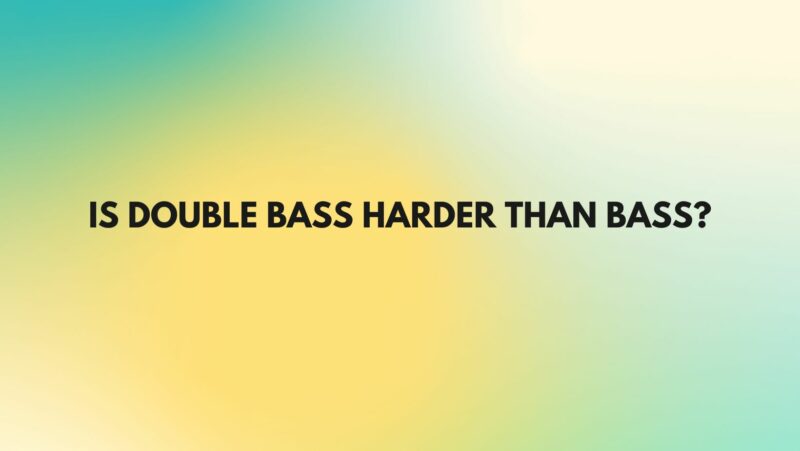The world of music is full of diverse and captivating instruments, each with its own unique characteristics and challenges. Two such instruments that often find themselves compared are the double bass and the bass guitar. Both serve as the rhythmic foundation in various musical genres, but they differ significantly in terms of size, technique, and musical role. In this comprehensive article, we will delve into the question: Is double bass harder to play than bass guitar?
Understanding the Double Bass
The double bass, also known as the upright bass or simply the bass, is a massive string instrument. It is the largest member of the string family and produces deep, resonant tones that form the backbone of classical music, jazz, and other genres. The double bass is typically played standing up or sitting on a tall stool, and it requires a bow for some styles of playing, although it is also commonly played with fingers.
Challenges of the Double Bass
- Physical Demands: One of the most immediate challenges of the double bass is its sheer size and weight. Standing at around six feet tall and having a large body, handling the instrument can be physically demanding, especially when it comes to transporting it and maintaining the correct playing posture.
- Technique: The double bass demands specific finger strength and dexterity to press down on the strings and produce clear, in-tune notes. The spacing between the strings can be wide, making accurate finger placement essential.
- Bowing Technique: For players who choose to use a bow, mastering bowing technique is an art in itself. Achieving control over tone, dynamics, and articulation with the bow takes time and practice.
- Intonation: Due to the length and thickness of the strings, maintaining accurate intonation can be challenging. Ensuring that each note is in tune requires constant attention.
- Repertoire Complexity: The double bass repertoire spans from beginner-friendly pieces to highly complex compositions that demand advanced techniques and musical interpretation.
Understanding the Bass Guitar
The bass guitar, often simply referred to as the bass, is a relative of the electric guitar and is part of the rhythm section in contemporary music. It features four strings and is played horizontally, resting on the player’s lap or supported by a strap. The bass guitar produces lower-pitched notes that provide the rhythmic and harmonic foundation in rock, funk, pop, and many other modern music styles.
Challenges of the Bass Guitar
- Fretting and Finger Strength: Bass guitarists need strength and dexterity in their fretting hand to press down on the strings and produce clear notes. While the strings are closer together compared to the double bass, developing finger strength is still important.
- Rhythmic Precision: The bass guitar is often responsible for holding down the groove in a band, requiring impeccable timing and rhythmic precision.
- Tonal Variations: Achieving various tones on a bass guitar can be challenging. Bassists use techniques like plucking, slapping, and popping to create different timbres, and mastering these techniques can take time.
- Musical Context: The role of the bass guitar is closely tied to the musical context. Bassists must adapt their playing style to fit the genre and the needs of the ensemble.
Comparing the Challenges
The question of whether the double bass is harder to play than the bass guitar depends on various factors:
- Physicality: The double bass is physically larger and heavier, making it more physically demanding to handle. Bass guitarists may have an advantage in this aspect.
- Technical Demands: While both instruments have their technical challenges, the double bass may have a steeper learning curve due to its size and the complexity of its techniques.
- Musical Context: The role of the bass guitar is more specialized, often requiring precision in timing and rhythm. The double bass has a broader range of musical roles and styles.
- Personal Preferences: Ultimately, the difficulty of an instrument is subjective and may depend on an individual’s preferences, prior musical experience, and goals.
Conclusion
In the end, whether the double bass is harder to play than the bass guitar is a matter of perspective. Both instruments offer unique challenges and rewards. Some musicians may find the physical demands and techniques of the double bass more challenging, while others may prefer the rhythmic precision and tonal versatility of the bass guitar. Regardless of which instrument one chooses, the journey of learning and mastering either the double bass or the bass guitar is a fulfilling and rewarding musical endeavor.


